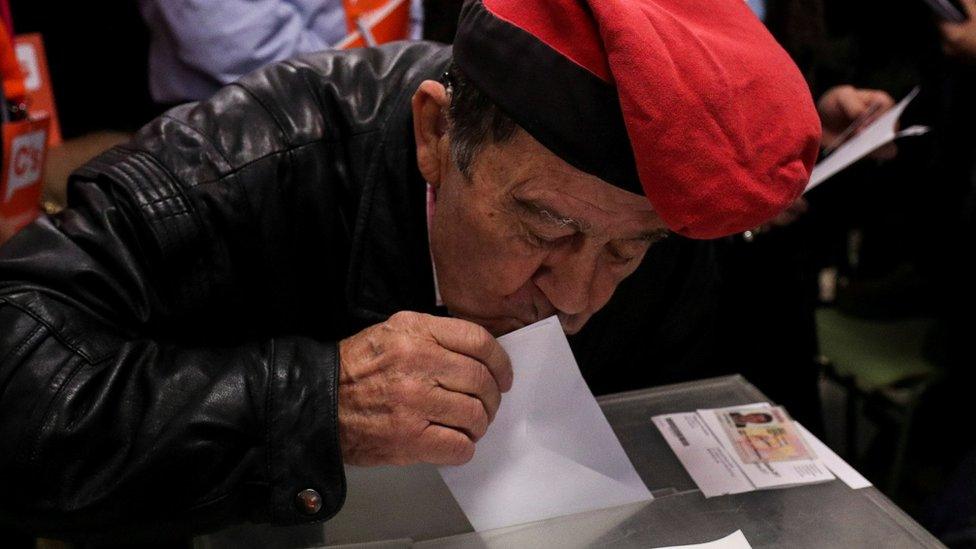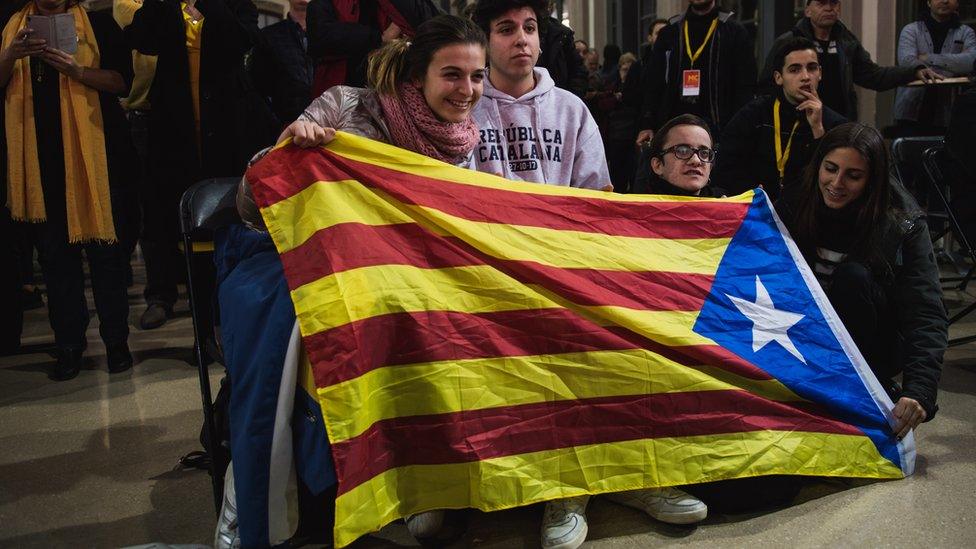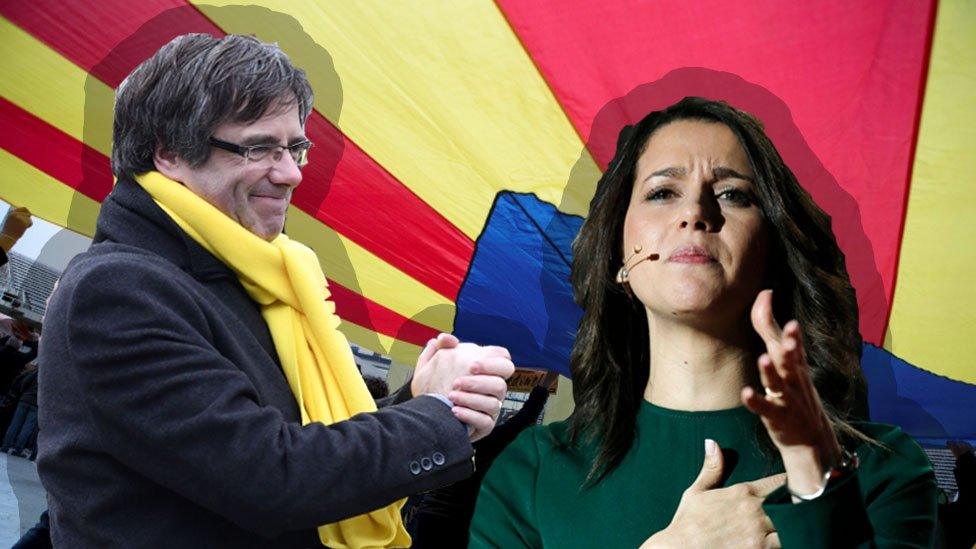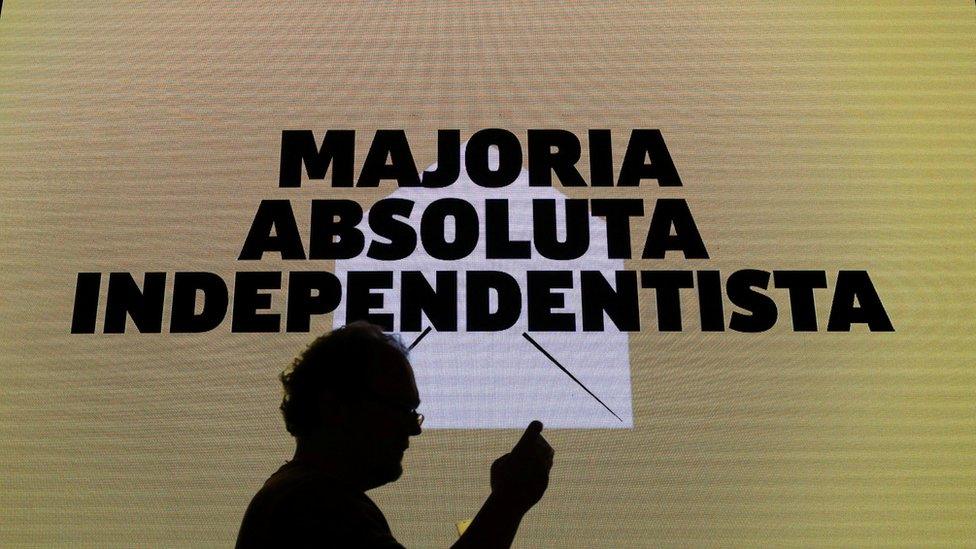Catalonia election: Separatist parties lead with most votes counted
- Published

One exit poll suggested separatist parties would win a majority
Separatist parties are on course to retain a majority in the new Catalan parliament, early results suggest.
The election pits Catalan pro-independence parties against those who want the region to remain a semi-autonomous part of Spain.
However, with almost all votes counted, the unionist Citizens (Cs) party had the biggest share of the vote.
A BBC correspondent says there seems little prospect that the election will solve Catalonia's political crisis.
Normally, the largest party has the right to try to form a government - according to the results so far, this would be the unionist party Citizens.
However, the separatist parties may insist they have the right to try first, if they have the largest number of seats overall.
Within the separatist party block, ousted Catalan President Carles Puigdemont's Together for Catalonia party was slightly ahead of the Republican left of Catalonia, led by his former deputy Oriol Junqueras.
Spain dismissed the separatist Catalan government in October after declaring the referendum to be illegal.
What do the Catalan crisis and Harry Potter have in common?
"Today we will demonstrate the strength of an indomitable people. May the spirit of #1oct guide us always," Carles Puigdemont tweeted, external from self-imposed exile in Belgium. Spain declared the 1 October Catalan independence referendum illegal.
But he said "this is not a normal day" and "neither is it a day of normal democracy". His team told the BBC that he was unable to vote as he was in Brussels.
Turnout was reportedly more than 80%, a record for a Catalan regional election.

Long queues of voters - but no pets
By Europe reporter Gavin Lee in Barcelona
No pets allowed - it's a pooches-at-the-door policy here in the central Barcelona polling station of Casinet d'Hostafrancs, and there must be one dog to every 10 voters.
Early voters queued in their dozens here 20 minutes before polls opened - something I didn't see in Berlin, Paris or Amsterdam this year for elections elsewhere in Europe. It may point to a record turnout across Catalonia.
Opinion polls predict up to 85% of the 5.3 million eligible voters will turn out.
In the queue Ana, a student, described it as "the most important election in the history of Catalonia". When polls close tonight the people, given the legal right to vote this time, will have shown the direction in which they want the independence crisis to play out.

Why is this election happening?
Separatists who dominated the Catalan parliament declared independence on 27 October, after the referendum.
In an attempt to stop that referendum, Spanish police stormed some polling stations. However voters defied the Spanish courts and riot police to cast their ballots.
A look at the key players in Catalonia's regional election
The move led to violent clashes with hundreds of people reported injured. Footage showing police tackling people at polling stations and pulling a woman by her hair caused outrage.
According to the organisers, 90% of voters were in favour of independence, but fewer than half the region's electorate took part.
Mr Puigdemont decided it was enough to declare independence from Spain.
Police were filmed violently tackling voters
Spanish Prime Minister Mariano Rajoy then sacked the Catalan government, imposed direct rule and called the 21 December election.
What happened to the Catalan government?
Prosecutors accused 13 Catalan separatist politicians of rebellion and sedition, including Mr Puigdemont and four others who fled to Belgium.
Among the accused, two pro-independence politicians are in Spanish prisons, and six are being monitored while on bail.
As a result, campaigning for Thursday's snap election has led to some unusual scenes, with Mr Puigdemont addressing rallies via a videolink from Brussels.
Oriol Junqueras has been sending messages to supporters from prison.
In the run-up to the referendum Mr Puigdemont's JxCat party had been allied to the ERC, led by Mr Junqueras.
But the ERC has opted out of a new alliance, making Mr Junqueras the main separatist rival to Mr Puigdemont.
- Published14 October 2019

- Published20 December 2017

- Published18 October 2019
